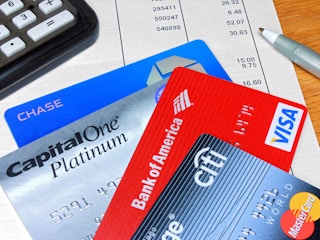Sooooo you’ve gotten into this whole credit card rewards thing. You want all the cash bac k . All the travel rewards . But you want to do it all while maintaining a good credit score , you’ve got to do things right. Pay off your statement on-time and in-full every cycle. Don’t charge more than you can afford, even if the rewards are tempting.
That might leave you wondering — is there such a thing as too many credit cards ? The answer is no, but there’s some serious nuance to that. Let’s talk about it.
Download the Krazy Coupon Lady App for more money smarts and the best deals of the day.
There is no universal maximum number of credit cards.
When it comes to credit cards, there is no specific number that’s ‘too many’ in terms of impact on your credit score. In fact, leaving credit cards open can be a net positive on your credit score for reasons we’ll talk about in a minute.
That said, there are specific instances where you might want to slow your roll.
Related: Best Travel Rewards Credit Cards
Four may be too many if you ask Equifax.

It’s not that Equifax doesn’t embrace the whole there-is-no-universally-good-number-of-credit-cards thing. They do.
But they also acknowledge that most people have limits. Managing multiple credit cards can be tricky, especially if you’re using them all on a regular basis. Equifax says two to three credit cards can have a positive impact on your credit mix. However, they also note that once you get to four cards or more, it might be too much for a lot of people to handle.
Five credit cards in the past 24 months is too many if you want a new Chase card.

If you’re eyeing up the rewards on a Chase credit card, you need to familiarize yourself with the 5/24 rule first.
The 5/24 rule is an unspoken but frequently observed rule specific to Chase. You can qualify if you’ve opened five or less cards in the past 24 months (inclusive of your application for the new Chase credit card) if you meet all the other underwriting requirements.
But if the Chase card would push you to six or more cards in 24 months? Expect your application to be rejected.
Related: Our Chase Sapphire Preferred Card Review
You might not want to pay annual fees.
Some cards come with annual fees. A lot of times, but not all the time, the annual fee can be waived for the first year.
After that, it’s costing you money to keep that card open. Plus, you might want to take advantage of the introductory bonus offers for that specific card in the future.
In this instance, you might choose to close that specific credit card. But you need to understand the negative ramifications of doing so first. If your credit score and other credit limits are high enough, you might be able to get away with it with minimal impact. But either way you need to be prepared.
Related: Best Cash Back Credit Cards
Closing credit cards can negatively impact your length of credit history.

While there are general rules of thumb about how many cards people can handle at a time, that doesn’t mean you should blindly close credit card accounts once you hit three or four.
The longer you’ve had a credit card, the more of a net positive impact it’s having on your length of credit history. This is the third-most important factor when calculating your credit score. It makes up 10% of your total score.
Closing credit cards can negatively impact your credit utilization.
Another big part of your credit score is credit utilization . It affects 30% of your credit score.
Let’s say you have a total credit limit of $25,000 across all credit cards. You currently owe $5,000 across all cards, which would put your credit utilization at 20%.
But if you closed one credit card with a credit limit of $10,000, it would lower your total credit limit to $15,000. That same $5,000 balance you owe would now put you at 33% utilization. Not good.
Applying for too many can send up red flags.

Simply put: applying for a ton of credit over a short time period will send up red flags to lenders.
Usually, the amount of damage done to your credit score after having a potential lender run a hard inquiry on your credit report is minimal. But if you have too many hard inquiries over a short period of time, those minimal impacts can add up.
Even if your score comes out unscathed, creditors still actually look at the information in your full credit report. If there are too many recent inquiries, it can send up red flags for them.
Are you desperate for cash?
Can you not afford your bills?
Why do you need this much credit?
It could make them more likely to turn down your application, whether you’re applying for another credit card or something else entirely, like an auto loan or mortgage.
You can have a ton of credit cards and still have a good credit score.
A post shared by Points & Miles • Family Travel Hacking | Katie Holden (@katiestraveltricks)
While not everyone has the behavioral restraint to safely manage tens of credit cards, there are people that make it happen. They use cards for rewards points and keep their credit utilization low with high credit limits across multiple cards. Plus they still manage to pay their monthly statements in full and on time so they don’t incur any interest.
These people are few and far between, but if you’re one of them, it’s totally possible to still have a good credit score with lots of credit cards.








































































